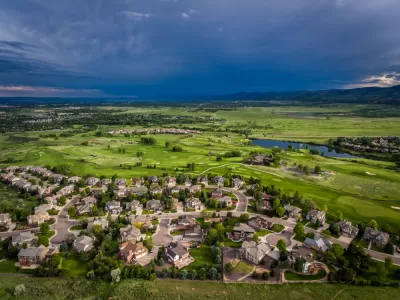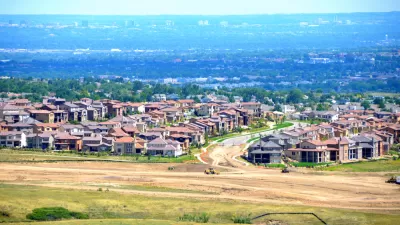Residents of the city of Lakewood have approved a ballot measure that caps annual residential development and requires City Council approval of all developments over 40 units.

"Voters in Colorado’s fifth-largest city on Tuesday approved a cap on residential construction that will be among the strictest in the metro area," reports John Aguilar.
Voters approved Question 200 with 53 percent of the vote, thus capping "the construction of new homes and apartments each year to no more than 1 percent of the existing housing stock in the city and would require City Council approval of large development proposals," according to Aguilar. According to Question 200, the "City Council must give explicit approval to any project that has at least 40 units."
Question 200 had a long route to the ballot box, clearing multiple legal hurdles before appearing before voters. The public approved the law despite most of the money spent on the campaign was devoted to defeating the measure.
Lakewood Mayor Adam Paul opposed Question 200, but most of the soundbites in the article are sourced from residents celebrating a victory.
Also voicing support for the vote, an opinion piece written a few days after voters approved Question 200 makes the case that the slow growth measures implemented by Question 200 will equal an effective climate action plan. Gary Wockner, the author of the opinion piece, hinges the argument on this paragraph:
Simple back-of-the-envelope math tells you that if you have less human consumers, you will have less population-caused GHG emissions. By slowing population growth, Lakewood will slow its GHG emissions — every city in Colorado could do the same thing, as could the state.
Wockner's argument in support of slow growth as a climate change mitigation measures has been directly refuted in the past.
FULL STORY: Lakewood voters pump brakes on home building, pass slow-growth initiative in special election

Trump Administration Could Effectively End Housing Voucher Program
Federal officials are eyeing major cuts to the Section 8 program that helps millions of low-income households pay rent.

Planetizen Federal Action Tracker
A weekly monitor of how Trump’s orders and actions are impacting planners and planning in America.

The 120 Year Old Tiny Home Villages That Sheltered San Francisco’s Earthquake Refugees
More than a century ago, San Francisco mobilized to house thousands of residents displaced by the 1906 earthquake. Could their strategy offer a model for the present?

HSR Reaches Key Settlement in Northern California City
The state’s high-speed rail authority reached an agreement with Millbrae, a key city on the train’s proposed route to San Francisco.

Washington State Legislature Passes Parking Reform Bill
A bill that would limit parking requirements for new developments is headed to the governor’s desk.

Missouri Law Would Ban Protections for Housing Voucher Users
A state law seeks to overturn source-of-income discrimination bans passed by several Missouri cities.
Urban Design for Planners 1: Software Tools
This six-course series explores essential urban design concepts using open source software and equips planners with the tools they need to participate fully in the urban design process.
Planning for Universal Design
Learn the tools for implementing Universal Design in planning regulations.
Ada County Highway District
Clanton & Associates, Inc.
Jessamine County Fiscal Court
Institute for Housing and Urban Development Studies (IHS)
City of Grandview
Harvard GSD Executive Education
Toledo-Lucas County Plan Commissions
Salt Lake City
NYU Wagner Graduate School of Public Service





























